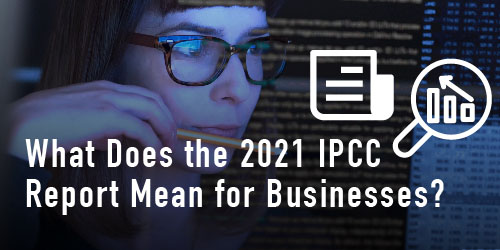What Does the 2021 IPCC Report Mean for Businesses?
On Monday 9th August 2021, the United Nations published its first report by the Intergovernmental Panel on Climate Change (IPCC) in 9 years. Building on their 2013 report, the document is a review of the science of climate change. It is the most in-depth report on the subject that has ever been created.
Why is This Report Important?
In the 21st century, Corporate Social Responsibility is a bigger part of business than ever before. Stakeholders and shareholders expect a degree of concern for the environment. There is a sustainable way to do business which takes into account ESG concerns.
The IPCC report is the most up-to-date assessment of knowledge on the climate crisis. It’s essential businesses take the time to inform themselves. Saving the planet is not a ‘one-size-fits-all’ decision. It is a constant commitment to change which involves staying up-to-date with the latest science.
However, the IPCC report shows the climate crisis is not just a moral issue. It is also a practical issue. The report highlights how soon the impact of climate change will begin to show around the world. In fact, the report confirms that ‘climate change is already affecting every inhabited region across the globe’.
This report is not intended to cause needless fear. It is a factual assessment of the impact climate change will have. As with any other factor that will affect business, organisations should take practical steps to deal with it.
What Does the Report Say?
The IPCC report does not leave any doubt about human impact on the environment. It states ‘it is unequivocal that human influence has warmed the atmosphere, oceans and land’. The authors compare the surface temperature of the earth to 1850-1900 and show it has risen by 1.09C. They also note that the past five years have been the hottest on record since 1850.
This might not seem so bad...until you consider the impact. The rate of sea-level rise has nearly tripled since 1901-1971. Since the last report, evidence for weather extremes and their link to human influence has increased. Around the world, we are seeing more dangerous heat waves causing forest fires, droughts and tropical cyclones.
But perhaps the most important part of the report is the influence on the future. The report also maps out some possible outcomes. They include five different paths that we might follow. Even in the best-case scenario, the temperature will continue to rise until at least 2050.
If we do not make changes, it could increase by over 2C within the century. They predict 1.5C will be reached by 2040 in all scenarios. We’ve already seen the impact at 1.09C. Imagine how significant it would be at 2C. Sea levels will also continue to rise by up to 2m by the end of this century.
For more information, please read the IPCC’s full report or the helpful summary for policy-makers.
The findings of the report are at odds with the goals of the Paris Agreement. The legally-binding agreement made in 2015 made a commitment to try and restrict temperature rise to 2C above pre-industrial levels - or, ideally, 1.5C. There is a lot of publicity when big players pull out of the agreement, but the latest IPCC report shows no one is doing enough.
This is where companies and organisations need to step up. Legal change can be slow but taking initiative will save money and show investors you are prepared to innovate.
How Will These Findings Change the Economy?
This year, for the second year in a row, The World Economic Forum ranked environmental degradation as the main risk to the global economy. There is no doubt that climate change will have an impact across every industry. The consequences shown in the IPCC report will disrupt products, services, supply chains, markets and asset values.
By 2040, the economy will have evolved due to climate change. Sometimes it’s easy to forget how soon this is. Most of us remember what we were doing at the beginning of the 21st century like it was yesterday. In fact, we are closer to 2040 than we are to 2001.
Perhaps the most striking impact will be the increase in ‘unprecedented’ extreme weather events. Such events are security risks for businesses. They destroy infrastructure and make some regions uninhabitable.
Climate change has already taken lives across the globe. In the past year alone, we’ve seen devastating flash floods in Germany, forest fires in Australia, and famine in Madagascar - as well as numerous other climate change-related disasters.
Studies show that at least 5 million deaths a year can be attributed to the climate crisis. That number is only going to rise.
There is also the damaging impact of mass-migration as coastal cities around the world grow vulnerable. Climate-based displacement will transform the world’s economy. In low-lying countries like Bangladesh, millions will have to relocate to survive.
Businesses have to take the lead in minimising this impact - for their own sake as well as the sake of the planet. The impact on the economy in 2040 depends on what preventative measures are taken in 2021.
Alongside tangible consequences, organisations have to consider the role of investments in the economy. Investors will no longer want to put money into plans that don’t consider environmental risks.
A climate change assessment should be a part of a comprehensive audit process. In the very least, all companies should be aware of their carbon footprint and at-risk assets.
How Should Businesses React to the Report?
Firstly, the IPCC report is a reminder of how important it is to stay informed and up-to-date on the question of the climate crisis. As we move forward, the changes will be more dramatic. Committing to carbon-neutrality is a great step that’s definitely worth considering, but you should make sure you’re taking the right measures to ensure this.
In the UK, there is no specific provision to report on environmental matters. However, the Companies Act does require directors to act in good faith, and show how they are doing their best for the company. According to Section 172, this includes actions regarding their ‘impact on the community and the environment’
Equally, the UK Corporate Governance Code 2018 requires reporting on how opportunities and risks to the future success of the business have been considered and addressed. This includes Streamlined Energy and Carbon Reporting that show the environmental impact of the company on the environment. There is certainly space for businesses to go further in their reporting.
One practical step is to get involved in shaping future policy. By playing an advisory role to governments, companies can help shape policy in a way that influences them.
As of 2021, the UK has an Emissions Trading Scheme which encourages certain businesses to reduce their carbon footprint. This type of ‘cap and trade’ program is helpful to companies and the planet by reducing emissions. However, there is always space for improvement in policy.
An additional step is to work with sustainable charities. There are numerous environmental charities you can work with. Pick one that aligns with your aims and values! Think of it as an investment in the future. The IPCC report is an important reminder of how close that future is.
Another practical step you can take in response to the IPCC report is consider your own ESG journey. An ESG report is a great way to start and figure out where you can go from there. Some industries even have specific ESG targets like the SRS for Housing Associations. Convene has recently developed. a new software, Convene ESG, to help streamline your ESG reporting process and compare you to your competitors efforts. The aim of this is to push forward sustainable practices across not just your organisation, but your whole sector.
Paying attention to ESG concerns does not damage business. Companies with a solid ESG strategy are just as profitable or outperform their unethical counterparts. It’s worth making your reaction to the climate crisis part of the design of your business so you don’t even have to reflect on it. You should already be doing a comprehensive risk assessment.
Some climate-related issues will have other positive effects. For example, flying Board members in from around the world wastes resources. Did you know that around 2.4% of global CO2 emissions come from flying?
This is just an example of one practice you might not even think twice about but it destroys the planet as well as wasting money. The pandemic has shown remote meetings can be just as effective as in-person meetings (if not more!). If exclusively remote working is not possible for your company, then the pandemic has also proven that hybrid working is more energy efficient.
A Board Portal like Convene can help you reduce your carbon footprint by meeting remotely. We are a paperless solution, which means you don’t have to print off numerous Board packs.
From planning a meeting to creating a secure audit trail, we can help streamline your governance processes and support your commitment to transparency. Don’t hesitate to get in contact and book a free trial today!








